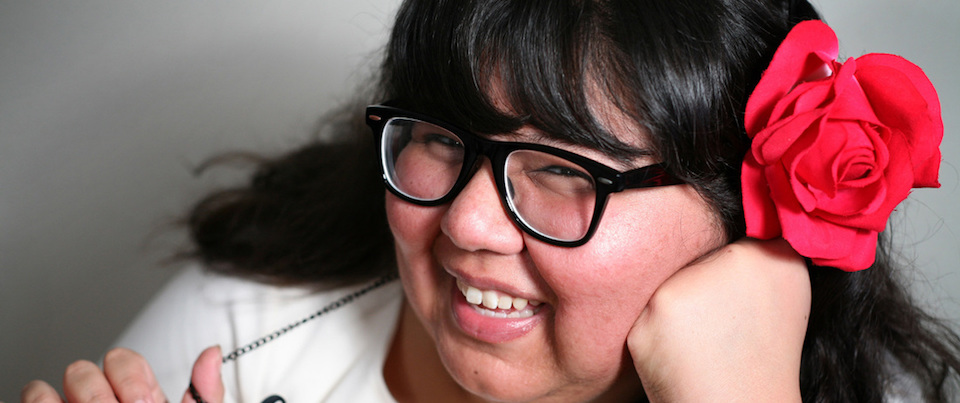“When was I introduced to fat phobia?” Virgie Tovar hardly has to pause to answer this. “I had a fantastic body image until I was in kindergarten,” she says. “That was my introduction to fat shame.”
Her response to all the shaming, years in coming, is steeped in research, activism and performance. Tovar, who graduated from Cal in 2005 and is now giving presentations at schools and universities, is running what she calls Babecamp—a four-week online course “for people who are ready to break up with diet culture,” running through July 30. Also this month, she introduced the first-ever Summer Fat Positive Festival in Berkeley, which played to standing-room only audiences. An encore presentation of her lecture, “Lose Hate Not Weight,” will be tonight (July 6, 6:30–8 p.m.) at the North Branch of the Berkeley Public Library.
“Virgie just lives her life unabashedly,” says Linda Bacon, an associate nutritionist at UC Davis and author of Health at Any Size, who attended the festival. “She is an incredible role model…. She embodies herself.”
The festival, sponsored by the Berkeley Public Library and organized by Tovar and a librarian there, included her lecture “Lose Hate Not Weight,” a night of movies, Fat Positive Shorts, and a reading and panel discussion. It concludes July 6 with the encore presentation of Tovar’s talk—the original was so crowded that people were turned away.
It comes at a time when the movement—call it fat pride, size acceptance or fat liberation—is getting increasing attention. There are a growing number of books debunking dieting, an array of bloggers in the so-called fatosphere and a regular Fat Activism Conference. And, increasingly, scholars and activists are linking size bias to other forms of discrimination—racism, homophobia, sexism and classism.
But there is also, of course, the unceasing barrage of messages about size and ways to fight fat. Walk down the magazine aisle at any newsstand and it’s hard to miss stories on how to lose leg fat, stop making those four swimwear mistakes or learn whether Kim Kardashian really Photoshopped pictures of her waist.
Virgie Tovar found herself in the midst of all of this. It’s hard to imagine that Tovar, a woman with an emphatic voice who often underscores a point in a “yeeees” that almost sounds like it’s being sung, ever felt too self-conscious to speak her mind.
Growing up in San Pablo, part of a close-knit Mexican-American family, size was never an issue. It never occurred to her that it would be. “My whole family was fat,” she says. “It was very unlikely that I wasn’t going to be. My whole lineage looked like me.”
But then came school and the daily reminders, she says, that she “was fat and that was bad.” And this is not unusual, she says. She points to research that found children as young as 5 felt it’s wrong to be fat. Asked by researchers if they would rather be fat or lose an arm, more said they’d prefer to do without the limb.
“They are memorizing expectations,” says Tovar. “They know how to get socially rewarded or punished. That education was already taking place.”
At a certain point, she says, she internalized the messages from outside her home and started to rankle at her family’s acceptance. Her grandmother made a Mexican meal every day, but instead of enjoying it, Tovar was mad that she’d tempted her with the food.
She went on her first starvation diet at 11, eating only toast, lettuce and barbecue sauce for three months.
“I was still too fat,” she says. “It felt like no matter how hard I tried I couldn’t reach this standard where I would be left alone. There is this cultural meme, where the girl comes around. She loses weight and men like her.”
The taunting about body size continued throughout high school, she says, and then the tone shifted, went underground and was more unspoken when she was a freshman at UC Davis. Two years later she transferred to UC Berkeley, which is where, she says, she began to see the common themes shared by those who face discrimination.
She enrolled in a peer-taught class about female sexuality and met a community of women who pushed her to think about living on her own terms. After Berkeley she taught high school for a year and then hosted The Virgie Show on CBS radio, where she discussed romance and sex problems.
“I brought this kind of alternative view of sexuality to the station and the listeners,” she said. “It was male focused and male driven but I put my feminist spin on it.”
But what about the health consequences of being fat? While there are health experts who warn it adds to the risk of heart disease, diabetes and other ills, some activists say the war on obesity is one more attempt to judge women by their size. Tovar says her expertise doesn’t lie in the conversation about health.
“I make no claims to health on behalf of myself or others,” she says. “I believe that all people regardless of status or size deserve a life free from bigotry and discrimination.”
Tovar went on to earn a master’s in human sexuality from San Francisco State University, then to pursue her own path—in writing, performing and teaching. She edited the anthology Hot & Heavy: Fierce Fat Girls on Life, Love and Fashion, was a plus-size fashion writer for BuzzFeed and now writes for the online sites Wear Your Voice and Ravishly. She loves fashion, wears what she wants and turns off the comment section on her own blog.
Jack Bauer, an acting supervising librarian at Berkeley Public Library, said he met Tovar after attending a talk of hers about body diversity and thought it would be a good subject for a library presentation. They got together and began brainstorming.
“It’s in line with kinds of discrimination that libraries all over the country are actively fighting against,” he said. “As public librarians, we take our role seriously of making space for all kinds of people.”
And so, on one early summer night, Tovar stood in front of a crowd of about 70 people of all sizes, introducing a variety of short films. There was a piece about two women’s experiences of being constantly shamed and reminded of their size, documentary footage of a German performance artist standing in a gallery naked on a scale made of melting chocolate, a short comic feature about romance as a size and access issue, and Aquaporko!, a documentary about a fat girls’ synchronized swim group in Australia.
There was no one message or theme. There were emotional moments, some resonating anger and frustration at a culture that is stubbornly size focused, but the films included laughter and joy. The night was, most of all, a celebration.
“I decided to come just to celebrate our bodies,” said Lauren Hawthorne of Hercules. “It’s amazing, revolutionary, taking people out of their comfort zones.”



















